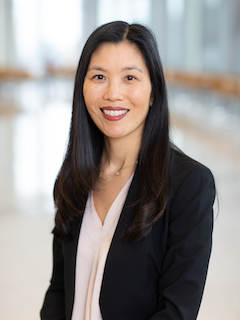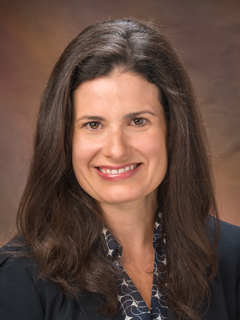HOW CAN WE HELP YOU? Call 1-800-TRY-CHOP
In This Section
CHOP Honors Two of its Mentoring Scientists with Carole Marcus Award

The goal of the Carole Marcus Award is to foster a culture of research mentoring to facilitate the successful research careers of CHOP’s junior investigators.
Mentors enrich the research experience at Children's Hospital of Philadelphia Research Institute by providing support as role models, personal advocates, counselors, and cheerleaders for the next generation of scientists. The Carole Marcus Award contributes to a wider mentoring environment at CHOP by promoting sustainable, innovative mentorship programs that facilitate junior investigators' successful research careers. This year, CHOP is recognizing two empowering mentors — Stella Chou, MD, and Lisa Schwartz, PhD.
As a midcareer distinction, this two-year award is in memory of pioneering sleep researcher Carole Marcus, MBBCh, who was an outstanding and generous mentor for fellows and faculty alike, and she had an unwavering commitment to academic rigor and transdisciplinary science. Ten Carole Marcus Awards have been granted over five application cycles.
Meet this year's recipients, and learn why they are motivated to help shape researchers' futures:
Dr. Stella Chou: Focused on Improving Pediatric Transfusion Medicine
Stella Chou, MD, is chief of the Division of Transfusion Medicine, and an associate professor of Pediatrics in the Perelman School of Medicine at the University of Pennsylvania. Her research focuses on red cell alloimmunization, regenerative blood cellular therapy, and the pathophysiology of pediatric hematologic diseases.
Dr. Chou plans to use the award funding to create a cross-disciplinary program — the Transfusion Medicine Research Training Program — to promote career development and mentoring for trainees and junior faculty interested in transfusion medicine research. By establishing the first pediatric transfusion medicine research training program in the U.S., Dr. Chou is working to build a robust portfolio of diverse transfusion medicine researchers at CHOP to enhance urgently needed pediatric transfusion medicine research, and to attract future trainees to the transfusion medicine field.
"The Carole Marcus Award provides an opportunity for me to build a community of researchers from diverse clinical backgrounds with a common interest in pediatric transfusion medicine to fuel innovative research and improve patient care," Dr. Chou said.
Dr. Lisa Schwartz, Committed to Adolescents, Young Adults Impacted by Cancer
Lisa Schwartz, PhD, is a psychologist and behavioral scientist, co-leader of the Mobile Health Research Affinity Group, and an associate professor of Pediatrics at Penn's Perelman School of Medicine and within the Center for Childhood Cancer Research at CHOP. The focus of her research is disease self-management, including health behaviors, healthcare utilization, and readiness to transition to adult care, among adolescents and young adults (AYAs) with chronic health conditions.
Most of her research is with AYA impacted by cancer, a group of patients with unique medical and psychosocial challenges. She has ongoing interventions that include digital health components, as well as prospective observational studies.
With the funding from the Carole Marcus Award, Dr. Schwartz plans to increase cross-disciplinary mentorship of graduate level and postdoctoral mentees, including behavioral scientists and physician scientists; expand predoctoral mentorship opportunities; facilitate writing and dissemination success via multiple initiatives; and engage in mentorship training.
"I have always benefited from excellent mentorship, and I find that mentoring junior scientists is the most rewarding aspect of my career in academic medicine," Dr. Schwartz said. "I am grateful for the protected time to provide mentorship on clinical research, especially as it relates to disease self-management, to mentees of all disciplines."

